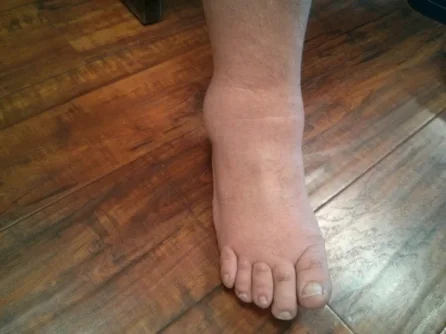Sodium retention is the main cause of water retention.
TRT can cause water retention and high blood pressure during the first weeks of treatment. This article mentions ways to deal with that issue
www.testosteronewisdom.com
The effects of growth hormone (GH) on sodium retention and extracellular fluid (ECF) are well established. The mechanisms are not clear but are thought to involve the GH/IGF-I (insulin-like growth factor I) axis. Men and women differ in their ECF and this contributes to men’s higher fat-free...
www.excelmale.com
Here are excerpts from an interesting paper:
"This is the first controlled study demonstrating that testosterone increases extracellular water ECW. Previous data concerning the effects of testosterone on plasma volume (19, 20) and urinary sodium excretion (18, 21) are limited and conflicting. The underlying mechanism is unknown, but several possibilities exist.
Testosterone could act directly on the kidney, because androgen receptors are expressed in renal tubules (31). There is evidence that androgens stimulate the expression of the angiotensinogen gene in the kidney (32, 33). Therefore, androgens could activate the local renal RAAS
to stimulate sodium and water retention through an autocrine or paracrine mechanism (34). The epithelial sodium channel plays an important role in the sodium balance, as demonstrated by genetic abnormalities in its activity, such as in Liddle's syndrome (35). It has recently been reported that androgens increase mRNA expression of the α-subunit of the epithelial sodium channel in a human renal cell line (36),
providing a potential mechanism of sodium and water retention by testosterone.
Plasma aldosterone Aldo levels fell significantly during testosterone treatment, whereas a modest fall, which failed to reach significance, occurred during GH treatment. During combined treatments, a significant fall in Aldo was also observed. The uniform trend toward a fall in Aldo levels observed with single and combined treatments suggests an adaptive response to ECW expansion. The observation that the fall in Aldo was greater in the presence of testosterone suggests that additional androgen-mediated mechanisms are probably involved. Androgen receptors have been identified in human adrenocortical cells and appear to exert an inhibitory influence.
In vitro studies have demonstrated that testosterone reduced the proliferation of human adrenal adenoma and adrenocortical cancer cell lines (38). It is possible that testosterone directly suppresses Aldo biosynthesis or secretion, but this remains to be demonstrated.
More on aldosterone
The effects of testosterone on the volume and distribution of ECW
could theoretically occur secondary to aromatization to estrogen in peripheral tissues. Estrogen may cause fluid retention through reduction of the plasma antidiuretic hormone (arginine vasopressin)-plasma osmolality set point (39, 40) or stimulating the synthesis of hepatic angiotensinogen (41), enhancing the overall activity of RAAS and leading to sodium retention. However,
this postulate is not supported by the observation that urinary sodium excretion is increased during oral contraceptive use (42) or that the plasma renin concentration is reduced in women receiving estrogen treatment (43). Moreover, estrogen reduces the plasma renin concentration, the activity of angiotensin-converting enzyme, and the Aldo response to angiotensin II (44, 45).
These actions of estrogen putatively generated from aromatization of androgens could explain the slight reduction in plasma Aldo levels in response to testosterone in our study." Source
I notice that I hold more water when I eat higher sodium foods, drink alcohol, and skip the gym for more than 3 days. Higher simple carb intake also worsens water retention. I weigh myself every morning. If I am not careful, I can gain 3-4 pounds of water in 1 or 2 days. Not drinking enough water also makes the body retain water. My kidney function (eGFR) is good (80).
I think decreasing sodium and sweets intake, increasing water consumption, and doing some cardio are ways to control water weight. If it gets bad, the use of a diuretic only once can stabilize this issue during days were I go off the wagon at my family's parties.
















